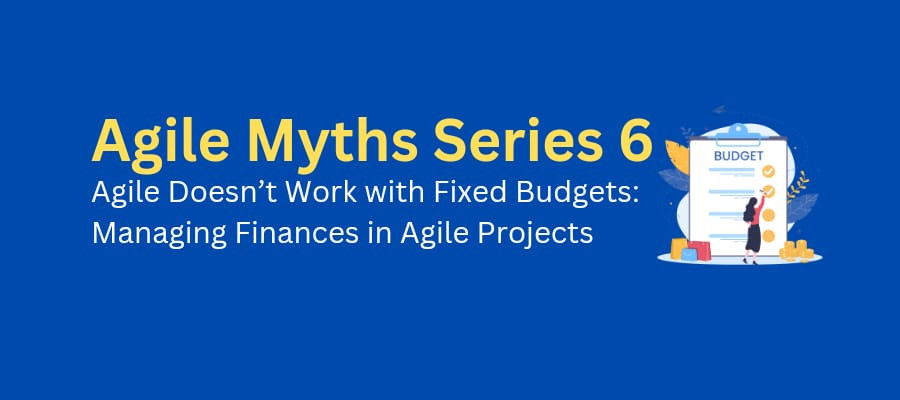Agile Myths Series 6 – Agile Doesn’t Work with Fixed Budgets: Managing Finances in Agile Projects

Welcome to the latest installment of our Agile Myths Series, where we debunk common misconceptions surrounding Agile practices. Today, we tackle the myth that Agile cannot effectively manage fixed budgets in projects. Many believe that Agile’s iterative and flexible nature conflicts with the need for budgetary control. However, Agile methodologies offer robust strategies for managing finances while delivering value and maintaining transparency. Let’s explore how Agile can successfully navigate fixed budgets and ensure project success.
The Myth: Agile and Fixed Budgets Are Incompatible
The perception that Agile cannot accommodate fixed budgets stems from a misunderstanding of its principles. Agile is often perceived as prioritizing flexibility and adaptability over financial constraints. However, Agile methodologies emphasize value delivery, continuous improvement, and stakeholder collaboration—all of which can be aligned with budgetary requirements.
What Are The Most Effective Agile Approaches to Manage Fixed Budgets?
Managing a fixed budget in Agile projects requires a strategic approach that maximizes value while staying within financial constraints. Here are some of the most effective Agile approaches:
1. Incremental Value Delivery
Agile promotes incremental delivery of working software, allowing teams to prioritize features based on business value. Agile teams can deliver value early and frequently within budget constraints by breaking down projects into manageable increments or iterations. This iterative approach enables stakeholders to see tangible results while controlling expenditures.
2. Prioritization and Value-Based Planning
Prioritization is critical in Agile project management. By collaborating closely with stakeholders, Agile teams can prioritize features and requirements based on their value to the business. This value-driven approach ensures that the most critical features are delivered within the allocated budget, maximizing return on investment (ROI) and minimizing financial risk.
3. Adaptive Planning and Flexibility
Agile frameworks such as Scrum and Kanban embrace adaptive planning, allowing teams to adjust priorities and scope based on changing market conditions or stakeholder feedback. This flexibility enables Agile teams to respond quickly to budgetary constraints or opportunities, reallocating resources to maximize value delivery.
4. Transparency and Continuous Feedback
Agile promotes transparency through regular communication and feedback loops. By maintaining open communication channels with stakeholders, Agile teams can provide visibility into project progress, budget utilization, and potential risks. This transparency fosters trust and enables informed decision-making, ensuring budgetary constraints are proactively managed throughout the project lifecycle.
Best Practices for Managing Finances in Agile Projects
Effective financial management is crucial for the success of Agile projects, especially when operating within fixed budgets. Here are some best practices to ensure financial discipline without compromising on value delivery:
1. Collaborative Budgeting
Involve stakeholders in budgeting decisions from the outset. Collaborative budgeting ensures alignment between project goals and financial constraints, fostering a shared understanding of priorities and trade-offs.
2. Iterative Cost Estimation
Use iterative cost estimation techniques to refine project budgets over time. Agile teams can leverage historical data, velocity metrics, and ongoing feedback to forecast costs more accurately and adjust plans accordingly.
3. Continuous Monitoring and Adaptation
Monitor budget utilization continuously throughout the project. Agile frameworks provide burn-down charts and financial transparency dashboards to track spending against planned increments. Regular retrospectives and reviews enable teams to identify opportunities for cost savings or reallocation of resources.
4. Empowered Teams and Accountability
Empower Agile teams to make informed decisions about resource allocation and scope management. By fostering a culture of accountability and ownership, teams can optimize budget utilization while focusing on delivering maximum business value.
How To Overcome The Challenges Of Managing Finances in Agile Projects?
Overcoming financial management challenges in Agile projects requires a proactive approach and continuous improvement. Establish clear financial goals and involve all stakeholders in budgeting and planning from the start. Regularly review financial performance and adjust plans based on real-time data to stay on track and maximize value delivery.
Additionally, empower Agile teams to make decisions and foster a culture of transparency and accountability. Use tools like burn-down charts and financial dashboards to provide visibility into budget utilization and progress. These practices ensure effective financial management while maintaining the flexibility and adaptability that Agile projects demand.
Let’s Wrap Up!
Agile is not just about flexibility—it’s about delivering value efficiently within your financial parameters. Agile methodologies are highly compatible with fixed budgets when approached strategically and focused on value delivery. Agile teams can effectively manage finances by leveraging incremental delivery and prioritization while delivering high-quality solutions. So, embrace Agile, empower your teams, and achieve your project goals confidently and clearly.
Reference:
ProjectManagement.com - Agile Finances on Projects: Cost and Procurement Management
How to Plan and Budget for Agile at Scale | Bain & Company



